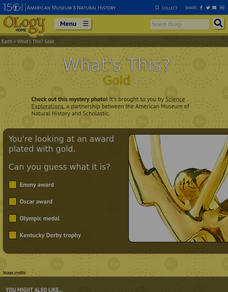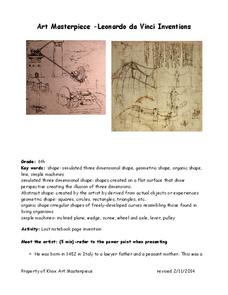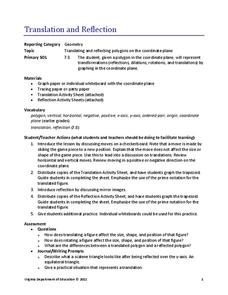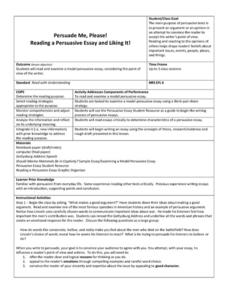American Museum of Natural History
What is Astronomy?
Go study the universe. Pupils learn seven aspects about astronomy and astronomers. They begin to learn about constellations; distance and motion between objects; gravity; the electromagnetic spectrum; dark matter and energy; and teams of...
American Museum of Natural History
What is Marine Biology?
A marine environment covers the majority of the earth but is arguably the least understood. Teach young scientists about the characteristics of oceans and ocean species using an interactive online lesson. The in-person or remote learning...
American Museum of Natural History
What's This? Gold
Cell phones are likely made of gold—at least part of them! An interesting lesson explains the conventional and not-so-conventional uses of the popular element gold. From the Inca empire to modern-day technology, learners discover gold...
American Museum of Natural History
What's the Big Deal About Water?
It may seem simple, but water is one of the most unique substances on Earth. An interactive online lesson describes its properties and importance in so many different situations. Learners interact with the lesson to learn the role water...
American Museum of Natural History
Bio-Benefits
Kick-start a discussion of the importance of biodiversity with a colorful resource that touts the benefits of maintaining healthy ecosystems. The images stress the interdependence of all the elements of an ecosystem.
American Museum of Natural History
Piecing It All Together
Archaeology digs are much like giant jigsaw puzzles. The artifacts found are often in pieces and scientists must reconstruct them. A hands-on activity lets young archaeologists experience this facet of the job as they create, smash, and...
PBS
Code Creators
The lesson is real—even if the computer code isn't. Scholars learn about pseudocode, which simulates computer code using everyday language. They write pseudocode for simple actions, then have classmates guess the action from the written...
Chandler Unified School District
Art Masterpiece—Leonardo da Vinci Inventions
After getting to know the inventor, Leonardo da Vinci and his many inventions, scholars think up their own invention. Following a written description and a hand-drawn picture, learners use a method of mirror writing and antiquing to give...
Virginia Department of Education
Translation and Reflection
Bring about the change you want to see in the world or at least in your lesson plans. Young mathematicians learn about translation and reflections by applying them to polygons on the coordinate plane. Results provide data to develop...
Alabama Department of Archives and History
African American Life After the Civil War - Sharecropping
What is the sharecropping system? What role did it play in the post-Civil War economy of the South? Who were the sharecroppers? Who employed them? How were they paid? To answer these questions, kids examine a series of sharecropper...
9/11 Memorial & Museum
Exploring Afghani Culture through Literature
Hosseini Khaled's The Kite Runner and A Thousand Splendid Suns are the anchor texts in a semester-long course that explores Afghani culture and traditions.
Teach Engineering
Electromagnets
Show your class what goes on with a magnet that can be turned on and off with a resource that provides the information needed to build an electromagnet. The information allows the class to understand that creating loops with the current...
Virginia Department of Education
Rotation
Rotate this resource into your lesson plans. Scholars rotate polygons in the coordinate plane by multiples of 90 degrees. They then compare the original and new figures to develop conjectures about coordinate points after rotations.
Teach Engineering
Fairly Fundamental Facts About Forces and Structures
Don't twist and turn looking for a resource. The first installment of a six-part series teaches young engineers about the five fundamental forces of compression, tension, shear, bending, and torsion. These forces help explain different...
Southern Nevada Regional Professional Development Program
Common Core Reading Standards: Understanding Argument
What does your class know about logical fallacies? They can find out quite a bit and practice identifying logical fallacies if you follow the steps and use the resources provided here! After reviewing ethos, pathos, and logos, ask small...
World Wildlife Fund
Take 6
Investigate the various properties of the number six with this elementary math lesson. From simple addition, subtraction, multiplication, and division problems to the creation of hexagonal tessellations, this lesson covers all aspects of...
DePaul University
The Working Tools of Insects
The animal kingdom is full of interesting organisms that have unique ways of surviving. Children read about different insects that have special tools for building homes and protecting themselves. When finished, learners identify the main...
Environmental Protection Agency (EPA)
Teachers' Guide to Using A Day In the Life of a Drop
Hydrology hopefuls learn about their local watershed. Through discussion and online interactives, they see that their habits affect the water supply. The lesson concludes with a pledge to filter out bad water usage habits. It makes a...
Japan Society
Japan in the World Since 1945
What have US-Japanese relations been like since the conclusion of World War II? Why do some commentators identify Japan's postwar years as a subordinate independence? Invite your young historians to research Japan's status in the world...
Mr. Roughton
The Maya Files
What a creative approach to studying about the ancient Mayan civilization! Learners will become investigators in the case of the "disappearance" of the Classic Maya by examining a variety of primary and secondary source material,...
Walters Art Museum
The Symbolism of Allegorical Art
Introduce learners to allegorical art with four bronze sculptures by Francesco Bertos. After modeling how to recognize bias and allegory in Bertos' Africa, class groups examine the other three sculptures in the series before creating...
Curated OER
Persuade Me, Please! Reading a Persuasive Essay and Liking It!
Persuade your writers that crafting arguments is not that difficult. They only need to follow the steps outlined in this resource.
Teach Engineering
Magnetic Fields
Introduce your class to magnetic fields with an activity that demonstrates that a compass is affected by the magnetic field of the earth, unless a closer, stronger magnetic field is present. Pupils can use this fact in the associated...
International Network on Personal Meaning
Journey of Personal Development (Part 1) – Know Yourself
Who are you? What are you? The two guiding questions found at the heart of any journey of self-discovery provide the framework for this outline of personal development seminar.
Other popular searches
- Geometry Shapes
- 3d Shapes
- Geometric Shapes
- Geometry Shapes and Pictures
- Three Dimensional Shapes
- Solid Shapes
- Area of Irregular Shapes
- 2d Shapes
- Drawing 3d Geometry Shapes
- 3 Dimensional Shapes
- 3 Dimensional Shapes
- 3d Geometry Shapes

























